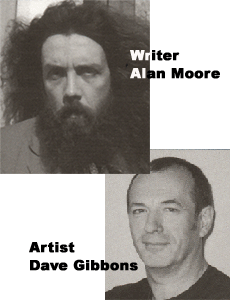

Continued from part 2, page 2...
PART THREE
A "Revolutionary" Comic
-Watchmen changes the world of comics
To many comics fans, Watchmen seemed "new" when it came out. The fans were aware
from the start that this would be a limited run series and that offered
the possibility for the story to be a complete one, with a beginning,
a middle, and an end. In that, we weren't disappointed, either.
As the 1980s began, DC Comics, publishers of Batman and Superman, acquired
the characters of the failed Charlton Comics company and were searching
about for something to do with them. After this purchase, writer Alan
Moore went to DC Comics executive editor Dick Giordano (who used to work
for the Charlton Comics company) and proposed the story that would become
Watchmen.
Giordano nixed the idea of using the Charlton characters because he felt
the characters would be so impacted by the Watchmen story line as to be
useless for further use afterward, but liked the idea Moore presented.
Moore was given the go ahead to develop the series as long as he recast
the Super Heroes as new creations, never before seen in comics.
Collaborating with artist Dave Gibbons, Moore set to work and thus was
born Watchmen, the first issue hitting the stands in September of 1986.
I snapped up my first copy and dived into it with relish. For the next
year, each month, I waited impatiently for the following 11 issues to
appear.
Now, nearly 20 years after it first appeared, I revisit Watchmen to see
what it holds for me. 20 years have passed during which time my political
philosophy has developed and enough time has passed to assess the decade
in which the series appeared. I have studied my country's founding
and discovered the reasons it was created and contrasted that history
with that of much of the rest of the world. Naturally, one cannot help but find the
rest of the world wanting after such study. Admittedly, I am not the same person I was 20
years ago. I am older, wiser and more discerning.
But, why go back to a comic book that is 20 years old? What possible relevance
could it hold now, this far into the future? As I re-read the Watchmen
series I discovered that all the political commentary contained within
is of the same flavor, with the same misconceptions and errors in analysis,
as that which I see from the same types of people today, in this era of
a Global War on Terror.
Of course, there's another reason: I still like a good story.
Many, though, will retort that it is "just a comic book" and
will wonder why the heck we should bother treating it so seriously. My
reason is that the philosophy and the politics presented were an integral
part of the story and were not just placed there incidentally and this fact makes a statement about the influences upon our youth who were, after all, the target audience of this series. Watchmen
was meant to disseminate those ideas to the country's young people. I
was one of those people and I did understand and drink in that point of
view only later to find it ill-informed if not entirely built upon out right lies.
Click to continue to part 3, page 2...




Home|Prelude|Part
1|Part
2|Part
3|Book
1|Book
2|Book
3|Book
4|Book
5|Book
6
Book
7|Book
8|Book
9|Book
10|Book
11|Book
12|Epilogue|Footnotes